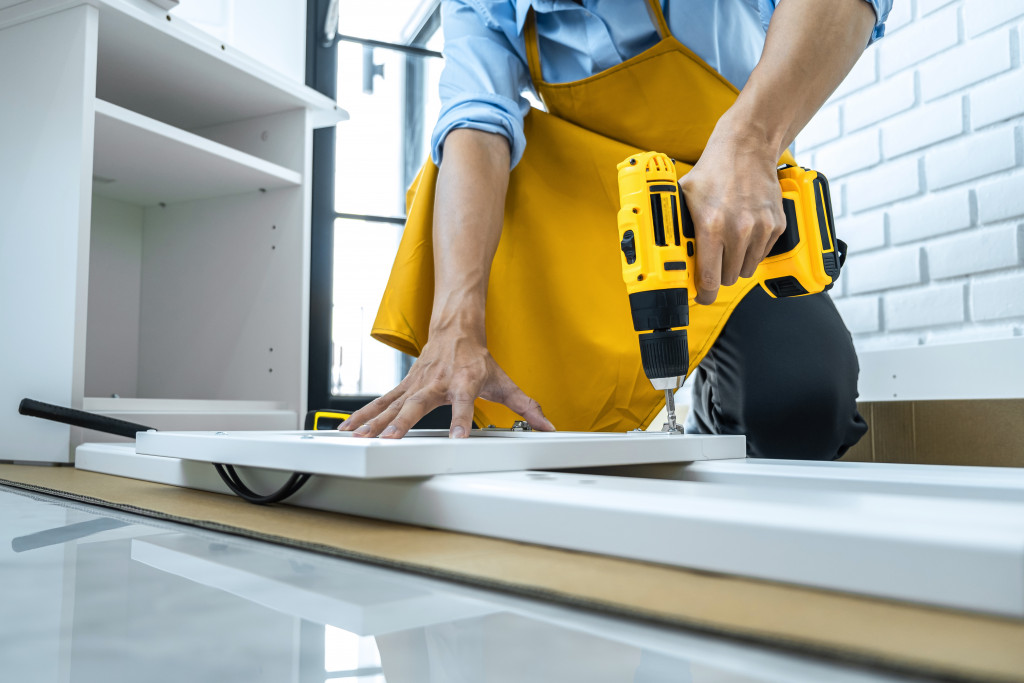- Comprehensive research and a well-thought-out pricing strategy form the foundation of a successful home improvement business.
- A detailed business plan, including all financial, operational, and marketing strategies, is crucial for organization and funding.
- Compliance with local licensing requirements and investing in safety tools/equipment are necessary to avoid legal issues and ensure safe operations.
- Building a strong brand identity and implementing effective promotional strategies are key to attracting and retaining customers.
As of 2023, there are a staggering 588,806 remodeling businesses in the United States. This marks a notable increase of 2.6% compared to the number of remodeling businesses in 2022.
Planning to start your own home improvement venture? The home improvement market is booming, and you can make a fortune if you start it right. However, starting a business from scratch is a challenging task.
You need to know the right steps and have the right strategies in place to succeed. This guide provides everything you need to know to start and succeed in your home improvement venture.

Research Your Market
Before you launch your business, research your market thoroughly. Identify your target market and analyze its needs. Research the competition – what types of services do they offer? What are their strengths and weaknesses? Use this knowledge to develop strategies for differentiating yourself from your competition. Consider local licensing regulations, zoning restrictions, and other laws that may affect how you operate your business.
Pricing Strategy
Once you thoroughly understand your market, it’s time to develop your pricing strategy. If you provide services like painting or drywall repair, decide how much you’ll charge for labor and materials. You may need to price per job, hour, square foot, or other measures. Consider setting an hourly rate plus an additional fee for materials. Make sure to factor all your expenses, including taxes, into your pricing structure.
Write a Business Plan
A business plan is a step-by-step guide that outlines your business, its goals, objectives, and strategies. It helps you stay focused and organized and secure funding from investors. Ensure that all your financial, marketing, and operational strategies are clearly defined when writing your business plan. Refine your plan until it is concise, clear, and complete.
Elements of the Business Plan
The business plan should include the following elements:
- Executive Summary: A brief plan overview, including its purpose and major points.
- Company Information: Background information about your company, such as its history, mission statement, and key personnel.
- Market Analysis: An analysis of the industry landscape, target market demographic, competition, and pricing strategy.
- Product/Service: A description of your product or service, including features and benefits.
- Marketing & Sales Plan: How you plan to market and sell your products or services, such as pricing strategy, advertising campaigns, and distribution channels.
- Operations Plan: Details about how the business will be operated daily, including staffing, inventory management, production processes, and quality control.
- Financial Plan: A thorough assessment of the financials behind the business venture, including startup costs, forecasted revenues, margins, expenses, cash flow projections, and break-even analysis.
Obtain Licenses and Permits
Before launching your home improvement business, it’s essential to obtain all required licenses and permits. Different states and regions have different licensing requirements, so research and comply with all applicable regulations. This can be a tedious process, but it’s essential, as failure to adhere to these regulations can result in costly fines, penalties, and legal consequences.
Business License
You’ll also need to secure a business license. This will open many doors for you, such as applying for loans and accessing different tax benefits. Once you have your license, keep it up-to-date and comply with all relevant regulations.
Build Your Brand
You need a strong brand identity to stand out from the competition and create a long-term home improvement business. Your brand should be relatable, memorable, and consistent. Ensure that your branding aims to attract and resonate with your target audience. The look and feel of your website and the content displayed should be relevant and easy to navigate and target the customers of your business.
Invest in Safety Tools and Equipment
As a home improvement business, safety should be your top priority. Invest in high-quality tools and equipment to ensure you can provide your clients the best service. Research local suppliers of personal protection equipment (PPE), such as hard hats, safety glasses, and hearing protection. You should also look for durable chain slings with high tensile strength. These slings can help lift heavy items, including pipes, pre-fabricated materials, and concrete slabs.

Promote Your Business
Finally, you need to promote your services to succeed in the home improvement business. Word of mouth is great, but it is essential to explore further marketing strategies to reach a wider audience. This could include advertising in local newspapers, billboards, online directories, social media ads, partnering with influencers, and more. However, ensure your marketing messages are clear, consistent, and targeted.
Starting a home improvement business is an exciting and lucrative venture. However, it requires careful planning, research, and execution. By following the tips in the article, you’re well on your way to success. Hopefully, this comprehensive guide has given you a headstart on a great entrepreneurial journey.



